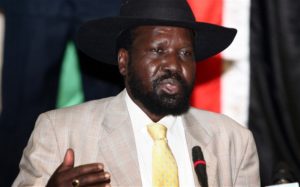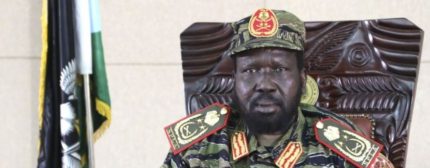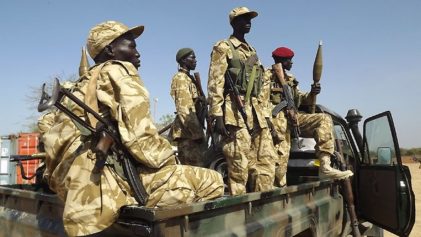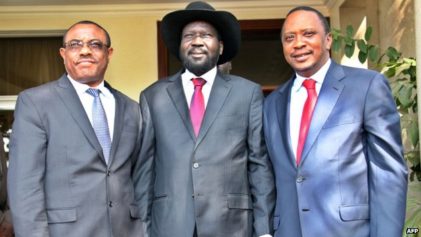After spending the last several years feuding with its northern neighbor, Sudan, the nation of South Sudan is now finding its biggest enemy is itself: The country is currently in a state of turmoil after its former vice president, Riek Machar, and a band of soldiers attempted a coup to overtake the government of President Salva Kiir.
After heavy gunfire in the capital city of Juba, Kiir said the attempted coup had been squelched.
Kiir held a news conference to announce that the the government was in full control of the capital, and that he was now imposing a night-time curfew on civilians.
This latest conflict has been building since July, when Kiir dismissed his entire cabinet, including his deputy Machar, in an apparent power struggle. Machar and other senior politicians have accused the president of intolerance and dictatorship. Their struggle is a reflection of a larger ethnic conflict in the world’s newest country, as Kiir is from the Dinka community, the largest in South Sudan, while Machar is from the Nuer, the second-largest. The Nuer have been complaining that the government is dominated by Dinka.
Machar has said he would contest the presidential elections in 2015.
After the coup attempt, Kiir, wearing military uniform rather than his usual civilian clothing and flanked by government officials, said the government was “in full control of the security situation in Juba,” and the attackers were being chased down.
He said the fighting began when unidentified uniformed personnel opened fire at a meeting of the ruling Sudan People’s Liberation Movement (SPLM). That was followed by an attack on army headquarters near the university.
He said the attacks were carried out “by a group of soldiers allied to the former Vice President Dr. Riek Machar and his group. The security organs will also undertake full investigations into these incidences, and the government will ensure that the culprits answer for their crimes before the appropriate law institution.”
“Rest assured that the government is doing all it can to make sure that citizens are secured and safe,” he said.
Several people were injured in the clash, including children, and hundreds have sought refuge at the U.N. mission in Juba.
Hilde Johnson, the U.N. special representative in the country, said she was “deeply concerned” and urged “all parties in the fighting to cease hostilities immediately and exercise restraint.”
“I have been in touch regularly with the key leaders, including at the highest levels, to call for calm,” she said.
South Sudan has spent the last few years engaged in conflict with Sudan, arising after South Sudan was granted its independence in 2011. The two sides seem unable to resolve the many disputes that come with sharing a 1,200-mile border — particularly when South Sudan needs the cooperation of Sudan to transport its oil shipments to the Red Sea.
Skirmishes between the two countries were so bad that two years ago South Sudan shut down its 350,000 barrels-a-day oil production — even though oil accounts for 98 percent of its GDP. The shutdown forced the government, which provides only a bare minimum of services to South Sudan citizens, to virtually stop paying its civil servants.
The ceasing of oil production in South Sudan also caused a drastic reduction in the income of Sudan, which lost three-quarters of its income when South Sudan seceded. The disputes center around how much South Sudan should pay to export crude through pipelines in Sudanese territory to a Red Sea port, and South Sudan’s accusation that Sudan stole $815 million of its oil. Sudan doesn’t deny the accusation, but says it took the crude to recoup unpaid transportation and processing fees.
Though South Sudan made more than $10 billion in oil revenue from 2005 to January 2012, the citizens of this new nation have seen no improvement in their quality of life as a result of its oil riches. This, unfortunately, is a common tale heard across the African continent. The deprivation in the lives of the average South Sudanese citizen is seen through the statistics:
*According to the U.N. Population Fund, South Sudan has the worst maternal mortality rate in the world, with 2,054 deaths for every 100,000 live births — primarily because about 90 percent of women give birth away from formal medical facilities.
* The South Sudan government reported that the illiteracy rate was 73 percent in 2011. Because of the decades of war with Sudan, only a handful of the population have been able to attend school.
* The capital of South Sudan, Juba, has only 110 kilometers of paved roads.



